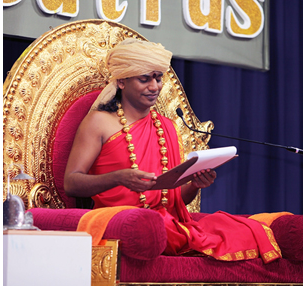

Paramahamsa Nithyananda
If I told you that expedition leader Martyn Williams had changed his name to Dheera Nithyananda and was now teaching courses on "Bliss through Meditation," you'd probably think he'd spent too much time in the thin air. Williams, no slouch to extreme adventure, was the first person to lead expeditions to the top of Mt. Everest and to the North and South Poles. Now, he takes followers on an adventure that takes place in the mind.
Martyn Williams' interest in meditation began in 2005 when he was running an adventure business. He had rejected Christianity, went on a four-day fast, and suddenly heard a disembodied voice. While he didn't understand what the voice meant, it made him begin to ask important questions, especially, "why are we here on this planet?" He went to India seeking answers and met a Hindu spiritual leader lovingly called Amma (the hugging saint). Next, he took a weekend workshop at Paramahamsa Nithyananda's Life Bliss Foundation near Bangalore, India. He noticed that Paramahamsa, a young enlightened master of meditation and Yoga, was able to help his students easily drop into a quieter space. Williams decided to become a disciple. Now, with his name changed to Dheera, he teaches courses for Nithyananda's Life Bliss Foundation of North America.
"The meditations I have learned from Nithyananda are very practical and they really do lead to rapid transformation," says Dheera. Dheera now divides his time between Vancouver and India, teaching Paramahamsa's meditation through bliss. "Most of the world is aiming for an external happiness -- the job, the car, the house -- they think that will make them happy, but it doesn't," he says.
"Most people are living like a yoyo, looking for happiness outside; but it's a fruitless game. It's only when you start calming down and looking inside that you feel peace within. That peace can make you more functional so you can actually be blissful in any situation."
Dheera is the first to admit that present lifestyles (a 24/7 dependency of cell phones, internet, ipods, etc.) make it very difficult to meditate in the classic way in which the person sits, is quiet, and can get inside his head. "Most people are too restless and too fidgety to do that," he says. "But there are fun and dynamic meditations that are much easier to access and can still get you to the same space."
The nature of mind is to constantly jump from thing to thing. Just one word -- such as "deadline" -- Dheera explains, can trigger a response. You can be meditating and you suddenly think "deadline." Pretty soon you're either worried or angry -- from just that one word because you stayed with that thought. If you hadn't grabbed onto it, "deadline" would have been replaced by the next thought and the next thought after that, and the next. Once you start relaxing, you can disconnect the word from your energetic system."
Psychologists say we have 60,000 thoughts per day, so how do we quiet all these thoughts? Dheera and other members of Nithyananda's team are presently visiting the U.S. and Canada to share information about the swami's life-transforming Inner Awakening event in India. If you can't make that event and find meditation is something you've never been able to do, Dheera suggests two easy ways to quiet your mind:
HUM: If you have a restless mind, rather than sit trying to stop your thoughts, just make a humming sound. And if you still can't stop the thoughts, hum louder, with great intensity. Your other thoughts will immediately start calming down. And if a thought comes in, increase the intensity on the sound even more. In just a few minutes, the mind will calm down. By the end of five or ten minutes, things in your head will be much quieter.
LAUGH: By laughing, you can fall into a no mind state. Think about a joke: someone comes out of the blue with a punch line that our mind doesn't compute, so we fall into laughter. That's like a deep state of meditation. When you first wake up in the morning, laugh for two minutes, and you'll feel the change in your body energy. Your entire day changes because your body likes that energy. Even after only five seconds of forced laughter, your body responds
While Dheera suggests at least 21 minutes of meditation, if that's too long for you, just do what you can do. "Breathe in bliss, breathe out bliss," he says. "Where attention goes, energy flows." And isn't that what it's all about?